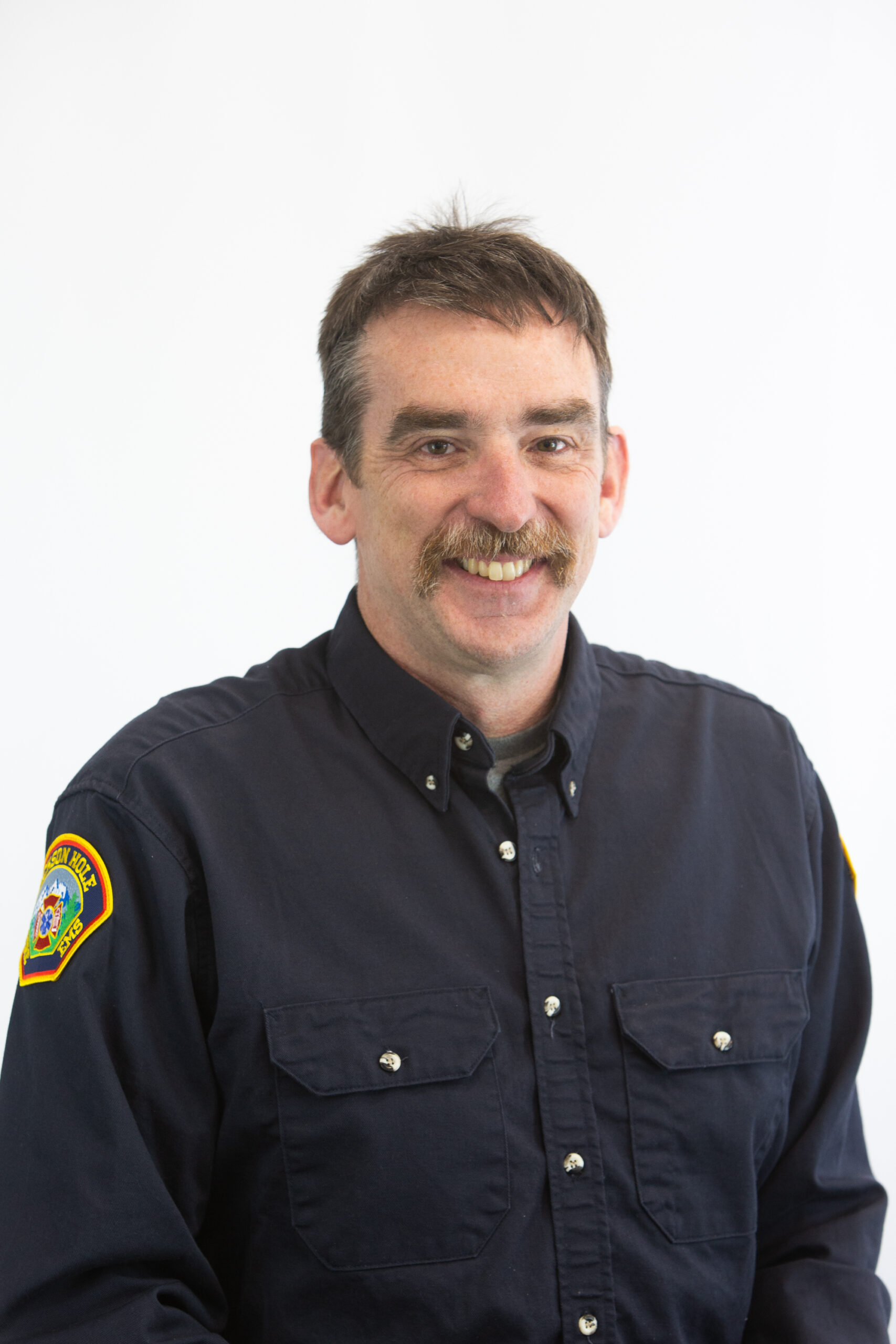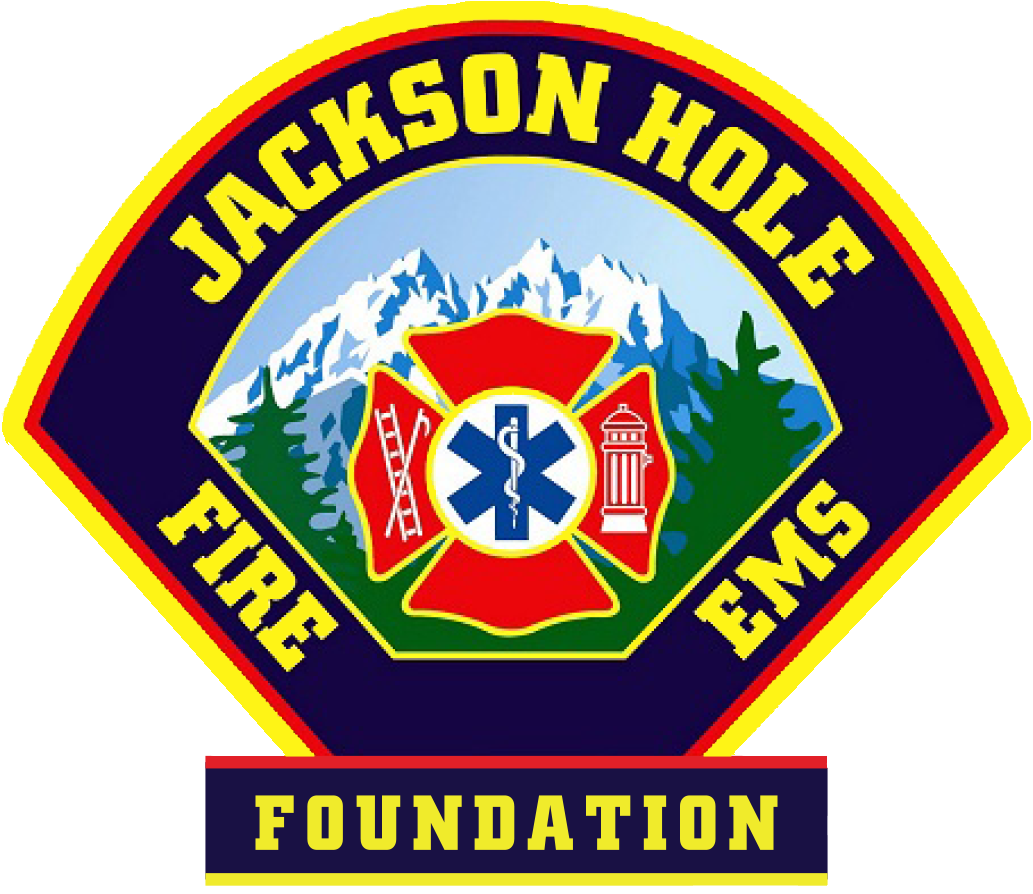
“Make use of the incredible resources around you; you’ll be surprised at what you learn.”
Matthew McGee
Matthew McGee
FFI/Paramedic
2022-Present
Where are you from? I am originally from Charlottesville, Virginia and I originally came to Jackson to work as a ranger. I had a seasonal gig while I was in college: I was in college in Montana at the time. I had kind of stumbled across this area doing some skiing and climbing in the area. Right after I graduated, I did some work with the Teton Science School out in Kelly and then did some field research for my masters degree on coyotes in Grand Teton National Park. In ‘97-’00, I moved down to Laramie and finished my graduate work there and worked for the University there as well. I worked as an assistant zoologist in Laramie and eventually ended up in Alaska in Denali on a wolf project up there. I moved back to Wyoming in 2004-05, and moved back to the valley in 2010.
What is your role in the department? I am a probationary volunteer member out of Station 4, and I recently applied for the internal hiring process. (Spoiler: he got hired!)
How long have you been a part of JH Fire/EMS? I officially came on in May of 2022.
What made you want to join initially? Originally, I had taken a WEMT course here from NOLS and I had started to think about ways that I could use that training here in the community. I had reached out and spoken to folks with JH Fire/EMS and TCSAR, but because of my work and where I lived at the time, I shelved the idea in the back of my mind for the future. Three years ago or so, the death of my mother from a traumatic injury really sparked my motivation to contribute in some way to emergency medical services here in the valley. She worked as a nurse for her whole career, so it was a great way to try to relate and to heal during that grieving process.
What are your current certifications? Fire 1, Hazmat, EVOC, and I will finish paramedic school in May of 2023. I am considered an EMT-I in the state of Wyoming and an AEMT by NREMT standards. I have been more involved in the wilderness side of things until this point.
What are your future goals in the department? I would love to be able to work as a Firefighter/Paramedic for the department. Every day here in the valley and every shift convinces me that it would be an awesome place to work. In the long term, I would love to be able to use some of my teaching skills to help out the department, to help out with EMT and EMR classes in the future.
What do you do for work? I’ve been teaching for NOLS wilderness medicine and working for Teton Valley Ranch Camp.
What do you do in your free time? I am an avid backcountry skier: I just love getting out into the mountains. I’ll take any chance to skin up something and ski back down it. I enjoy mountain biking as well and getting out onto the trails around here; that’s something I’ve pretty heavily pursued. I love backpacking in the Winds and in the Gros Ventre, and I also really enjoy chances to cook food with my family. I love reading and hanging out with my family and playing games.
Speaking of family, how do they feel about this new pursuit of yours? It definitely requires family support when you jump into this area of work, and recognizing that calls can go out at any time. They definitely understand the ‘why’ behind me wanting to do this work. As a family, we’ve always had each other’s backs in this way. I definitely embraced mission-driven careers, so I’ve always had great support from them through this process.
What would you say is your favorite part of volunteering? The people. I’ve had a chance to get to know the Station 4 team and it is just such an awesome group. I’ve learned a ton and really had a good time being a part of that crew. We just came back from the winter fire school and it was really fun to get to reconnect with them.
What about the most challenging? For me, this last fall was kind of a juggling act: working a full time job, having a family, being a paramedic student, keeping up on classes, clinical time, being in fire academy…trying to put my best effort into those was a challenge for sure. There’s so much to learn, and trying to put the effort and intention into it was difficult. I think that’s true for a lot of the volunteer community.
What advice would you give new recruits? Tap into your officers and mentors early on in the process. People are so willing to take time and work with you and explain how things work. Make use of the incredible resources around you; you’ll be surprised at what you learn.
Is there anything you wish you had known when starting? Sometimes I look back and wish I could tell myself to ‘be more patient with yourself.’ There’s time to figure everything out: you don’t have to try to do it all at once. Be patient, take your time, and try to learn the skills well.
What is the most valuable trait for someone to have in this line of work? I think one of the things that keeps rising up is accountability…the character trait that I’ve seen and respected the most is that ability to take on any task that’s assigned and to do it well. I think that’s what people in the community expect of us: they want pros and people who are accountable to do a good job. It’s important to be able to be held accountable to the expectations of the community.
What do you think you bring to the department? Maybe a little more life experience, just because I’ve had different careers and worked in a variety of different experiences throughout my life. I think my strengths and my experience as an educator are helpful, and bringing that ability to be helpful in the training side of things…I think also my investment in my own advanced medical training will be an asset for me within the department. It definitely feels like a need as I see the demand for that with calls, being that EMS calls make up the majority of our response.
Who is your mentor/who do you look up to? I would say several people so far. I have been lucky to spend some time with medics that were willing to precept me; Kevin Grange has been awesome in that regard for me: he gives great feedback and guidance. Ian Cranston, he precepted some of my clinical time, and he’s been really helpful as well. For Station 4, I’ve learned from all of the members out there: Captain MacFarland, Brian McDaniel, etc.
